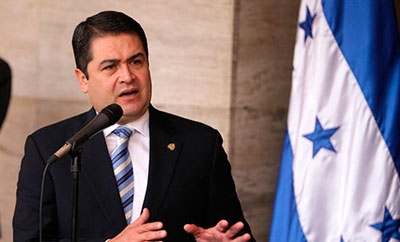Honduras’ new President Juan Orlando Hernandez garnered a 66 percent approval rating in a new CID/Gallup poll, indicating significant public support for a president whose election in late 2013 raised international concern regarding his hard-line stance on crime.
When asked to name Hernandez’s accomplishments in the first 100 days of his administration, 26 percent of respondents mentioned crime reduction, 10 percent listed creating Honduras’ special Military Police of Public Order (PMOP) and 7 percent cited generating new jobs and helping small businesses, reported La Prensa. Hernandez designed the military police — which became operational last year — during his time in Congress.
SEE ALSO: Honduras News and Profiles
Despite support for his stance on crime, only 38 percent of respondents believe corruption has decreased under Hernandez, compared to 35 percent who think it has not changed and 22 percent who believe it has increased.
InSight Crime Analysis
President Hernandez entered office with a weak mandate, capturing only 34 percent of the vote in Honduras’ November elections, compared to rival Xiomara Castro’s 29 percent. That he now commands a 66 percent approval rating speaks to the popularity of his “mano dura” (iron fist) measures, which represent a continuation of anti-crime policies originally initiated by former President Ricardo Maduro (2002-2006). Hernandez’s support for such measures, which include a militarized approach to citizen security, has caused concern from both international and local experts.
Despite the popularity of this approach, its effects are questionable. After years of such measures, Honduras is currently the most dangerous peacetime country in the world and has become a major hub of organized crime activity, while gang and street crime remains rampant.
Mano dura policies can also lead to mass incarcerations by providing security forces with sweeping authority to arrest people merely on suspicion of gang affiliation. In addition to raising human rights concerns, this has caused serious overcrowding in prisons in Honduras and neighboring El Salvador, which has in turn allowed gangs and violence to flourish inside the jails.
This security approach has also been criticized for failing to address root causes of criminality, such as institutional corruption and unemployment. Honduras’ police force is notoriously corrupt, and impunity remains rife in the country. While Hernandez’s short term gains may be popular, in order to see a sustained reduction in homicides and crime, it will likely be necessary to address these factors as well.

